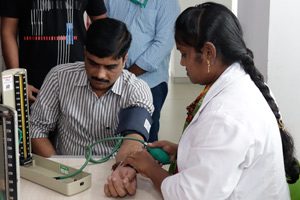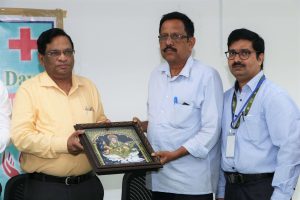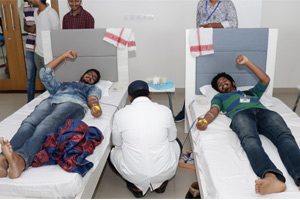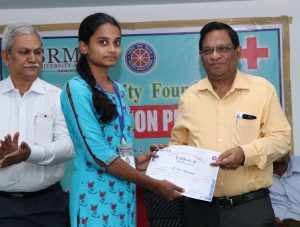Tech Fest/Hackathon
On Feb 28th, 2019 at the 2nd edition of the SRM AP Tech Fest Dr. S. Chandrasekhar, Director, CSIR-Indian Institute of Chemical Technology will preside as the Chief Guest. Dr. Chandrasekhar, is a J.C. Bose National Fellow. The inauguration program is from 10.30 a.m. to 12 noon, followed by an Interaction Sessions with Dr. Chandrasekhar.
- Published in Events
Pitchathon 2k19
24-hour event with loads of “getting to know” exercises and a fun competition to top it all.
We start with a founder’s speed dating event and end with a B-Plan pitching competition!
There’ll be food, goodies and loads of fun!
Winners get cash prizes and an experience worth cherishing.
- Published in Events
SRM University, AP – Amaravati celebrates Founder’s Day
Organises a Blood donation camp to honour Founder’s vision to serve the community

Amaravati, August 24th 2019: SRM University, AP – Amaravati celebrated Founder’s Day by organizing a blood donation camp. More than 120 college students and faculty have donated blood in the camp of which several were first time donors.
 On this occasion, Prof. D. Narayana Rao, Pro Vice Chancellor, SRM University, AP-Amaravati presided over the program and shared the Founder and Chancellor, Hon’ble Member of Parliament, Dr. T.R. Paarivendhar’s vision and generous contributions to the society through various social services activities. “21 educational institutions have been established by SRM management under the leadership of Dr. Paarivendhar and till date around 1.10 lakhs students have passed out from different educational streams. Our Founder’s vision is to provide education to all and has therefore provided scholarships to the tune of Rs. 35 crore till date to the underprivileged sections of the society. The SRM institutions have more than 7,000 employees and 70,000 students currently.” shared Prof. Rao.
On this occasion, Prof. D. Narayana Rao, Pro Vice Chancellor, SRM University, AP-Amaravati presided over the program and shared the Founder and Chancellor, Hon’ble Member of Parliament, Dr. T.R. Paarivendhar’s vision and generous contributions to the society through various social services activities. “21 educational institutions have been established by SRM management under the leadership of Dr. Paarivendhar and till date around 1.10 lakhs students have passed out from different educational streams. Our Founder’s vision is to provide education to all and has therefore provided scholarships to the tune of Rs. 35 crore till date to the underprivileged sections of the society. The SRM institutions have more than 7,000 employees and 70,000 students currently.” shared Prof. Rao.
 The University’s NSS division organised a blood donation camp together with the international Red Cross society. This was in line with the Founder’s vision to serve the community.
The University’s NSS division organised a blood donation camp together with the international Red Cross society. This was in line with the Founder’s vision to serve the community.
“SRM Management is spending generously for the welfare of the underprivileged people.”, commented, D. Gunasekaran, Registrar, SRM University, AP – Amaravati. The Registrar also motivated and thanked the students by emphasising that blood donation is a big contribution towards the welfare of the society.
Dr. Lakshmi Rajyam, University Medical Officer, SRM University AP-Amaravati encouraged the students and staff to donate blood and explained, “A healthy body is capable of regenerating the blood donated in a few weeks’ time. India needs about 5 crore units of blood annually but has only 2.5 crore units available. This deficit can only be bridged if everyone comes forward to donate.”
Present for this celebration were – ProVC, Registrar, Deputy Registrar, University Medical Officer – Dr. Lakshmi Rajyam and Red Cross Guntur District incharge, Mr. Narasimha Rao along with faculty and students.
 At this occasion, 20 NSS students were awarded certificates for their remarkable contributions to the community. The University got together and cut a cake to mark Founder’s Day.
At this occasion, 20 NSS students were awarded certificates for their remarkable contributions to the community. The University got together and cut a cake to mark Founder’s Day.
Video Link: https://www.youtube.com/embed/ZHih6PGfI-0
- Published in Events
IEEE Membership Brings Worldwide Networking Opportunities
IEEE (Institute of Electrical and Electronics Engineers) with over 120,000 student members is the world’s largest technical professional organization dedicated to advancing technology for the benefit of society. It does so through its highly-cited publications, conferences, technology standards, professional and educational activities.
SRM AP became a member of the IEEE in November 2018 and has 500 student members already.
Agniswar Paul, chair of IEEE SRM AP student branch says, “We will be looking to offer our members numerous professional advantages over and above the curriculum and academic experience. These could be participation at regional conferences, workshops, competitions like student paper contests and even scholarships. Also, opportunities in project/design programs.”
A vast network of member organisations helps create many of these opportunities. IEEE has more than 417000 members in more than 160 countries, more than half of them outside the United States. Student members begin by connecting with local communities active in research and authorship and engaged in important conversations on current and relevant technical topics. Georgy Jose, a student of Chengannur College of Engineering won the third prize from the IEEE Coding Competition, later bagging a placement in an American multinational IT company UST GLOBAL.
“All SRM AP members of the IEEE will gain ample exposure, enough to work on Research Papers and get published in world-class journals. Students will also be mentored to work on ideas perfected by thousands of academicians across the globe. They will also get a chance to attend conferences of their choice in any part of the world depending on their experiences and academic track record”, says Agniswar.
The IEEE Chapter at SRM AP kick-started this semester with a promotional event “GAME OF CLUES” on August 21st.
- Published in Events

